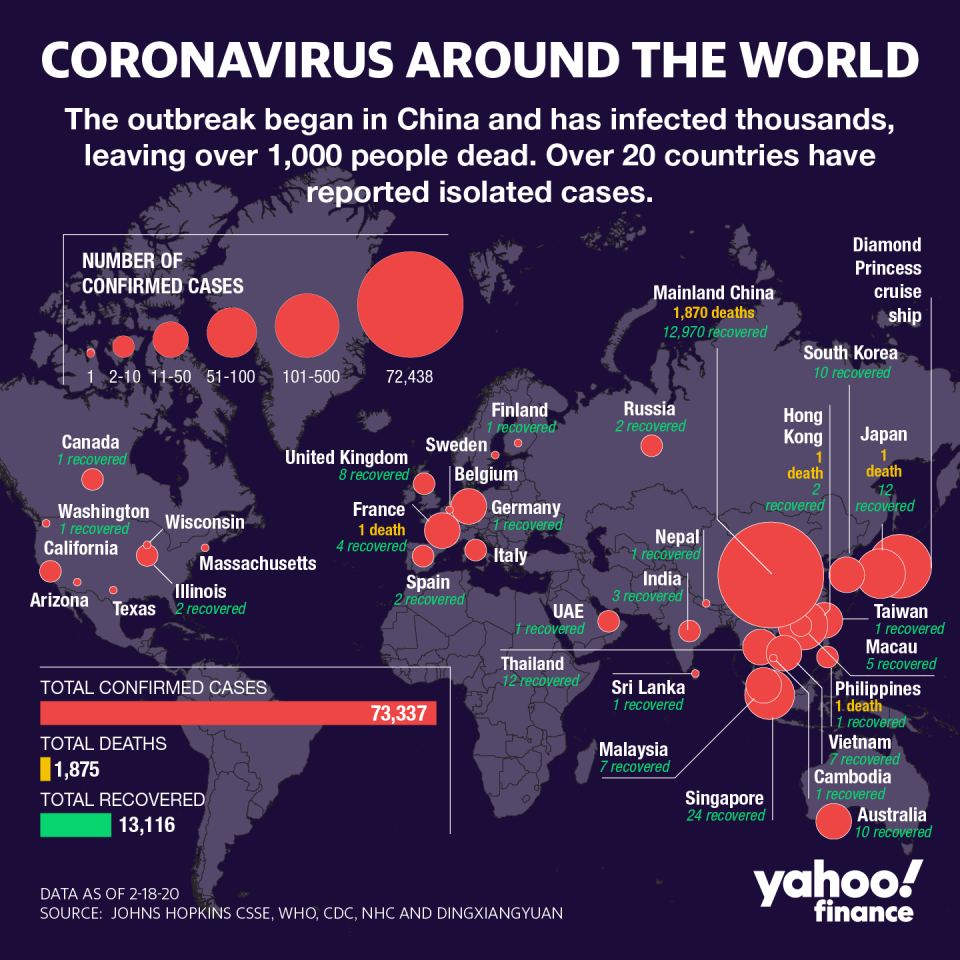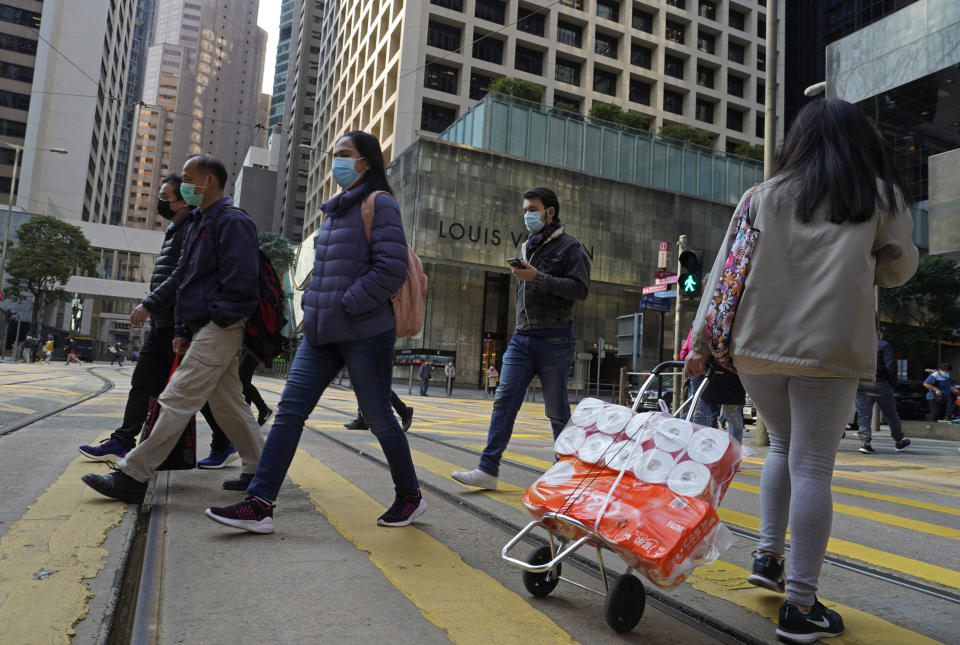Walmart, Apple warn of coronavirus hit to bottom line
China’s coronavirus (Covid-19) outbreak continues to claim lives, infecting new patients — and hitting the bottom line of major corporations.
On Tuesday, investors digested warnings from Apple (AAPL) and Walmart (WMT), two of Corporate America’s biggest giants. The iPhone maker said on Monday that the virus’ impact on demand — which forced it to shutter its stores in China — would undermine its revenue guidance for the first quarter.
Meanwhile, the retail giant also suggested the coronavirus could be a drag on the current quarter, after weak holiday sales caused the company to miss earnings forecasts.
The disease remains largely contained to the mainland and its immediate region, but China has yet to stem the rising tide of infections, with the domestic death toll rising to over 1,800 over the weekend.
Meanwhile, a wide range of industries — including technology, retail, food and travel/leisure — are warning that the disease is hampering their ability to operate in the world’s largest economy, which only recently brought its factories back online this week after the Lunar New Year break.

Last week, Factset data showed that 138 companies have discussed the virus on earnings calls, with the average revenue exposure to the country being 7.2%. For all S&P 500 Index (^GSPC) companies, that figure is less than 5%, and many companies have said it was too soon to gauge the effect.
A growing list companies have been affected by the outbreak, and are expected to feel the effects through the first half of the year. Among the latest is Boeing (BA), which on Wednesday said the outbreak is affecting Q1 jet deliveries and air traffic, amid widespread travel restrictions and airlines suspending China travel.
Separately, Chinese retail giant Alibaba (BABA) also warned this week that the disease represented a “black swan” — or an unusual event in one region that has global consequences.
“Given the large number of companies that did not update or modify guidance due to the impact of coronavirus, it is possible that there will be an increase in the number companies issuing negative guidance later in the first quarter as these companies gain clarity on the impact of the coronavirus on their businesses,” Factset said.
Some economists are waiting to see just how much of an impact it has on the global economy. Yet it is becoming increasingly clear that multinationals with heavy exposure to China will feel the sting during the first quarter of this year, and perhaps beyond.
Federal Reserve chair Jerome Powell has said the U.S. is watching the developments of the virus, but still anticipate a low impact to the country. However, during earnings calls in the past few weeks, the virus has been cited as a material factor going forward.
The numbers are likely to start showing up by March, and multiple year-end earnings calls are already reflecting concern over the impact of the virus.
Emerson Electric (EMR) CEO David Farr told analysts on an earnings call that “for people not to think that it would not be a negative short term, I don’t think they’re thinking straight...It will be a negative for the global economy.”

Travel bans, shut offices
No industry has seen as immediate an impact as travel and leisure, but consumer-facing tech and food companies have sharply curtailed operations in China. Major U.S. restaurant chains such as Starbucks (SBUX), McDonalds (MCD), Burger King and YUM Brands’ (YUM) have shut down many or all stores in mainland China.
On the mainland, big U.S. technology firms have closed offices or manufacturing plants, and restricted travel to the region. Apple’s Foxconn manufacturing plant having resumed minimal operations Tuesday after a significant delay. The production halt in the past few weeks is likely to impact the first quarter, as well as availability of products such as Air Pods.
The tech giant is also launching a new phone in March, and it is unclear if it can still make the target launch date following the virus’s impact. Separately, Google (GOOG) has also shuttered all offices in mainland China and Hong Kong, while Nintendo said its popular Switch consoles are sold out in Japan — with future shipments delayed because of the virus.
China is a big part of the supply chain for automakers, and names like General Motors (GM) and Tesla (TSLA) have at least temporarily shut down their operations in the country.
With virus scares cropping up on at least a few ships, cruise liners have been denied entry to several ports and have had to quarantine passengers when a positive case is identified. They have also canceled some trips bound for China and the surrounding region, added additional layers of screening — and banned people who have traveled to the affected region.
Carnival Cruise Lines (CCL) said Wednesday it was expecting a material impact from the virus, which it did not immediately quantify — and that it would consider canceling all cruises to Asia if need be. Meanwhile, Carnival and Norwegian (NCLH) continue to deny passengers with passports from China, Hong Kong or Macau, meanwhile Royal Caribbean (RCL) recently revoked that policy.
Amid stiffening travel restrictions and a viral spread that’s yet to be checked, major airlines have curtailed and suspended travel to China en masse, until early spring at the earliest. The list includes United Airlines (UAL), American Airlines (AAL), Delta (DAL) and Cathay Pacific (CPCAY).
Ryanair (RYAAY) CEO Michael O'Leary told analysts on the company’s earnings call that “longer term, we don’t think the coronavirus will have any impact whatsoever,” citing past experiences with severe acute respiratory syndrome and the avian bird flu.
“More people were likely to holiday in Europe rather than travelling long-haul to Asia...and we would think that will play out again,” O’Leary said. “But we should be wary on the short-term impact."
Luxury and retail bigs like Nike (NKE) and Burberry (BURBY) have also shut down a large number of stores.
Anjalee Khemlani is a reporter at Yahoo Finance. Follow her on Twitter: @AnjKhem
Read the latest financial and business news from Yahoo Finance
Follow Yahoo Finance on Twitter, Facebook, Instagram, Flipboard, SmartNews, LinkedIn, YouTube, and reddit.
